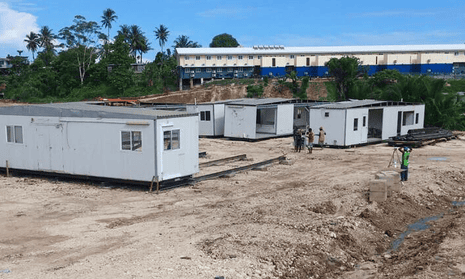About 60 refugees held by Australia on Manus Island will be moved to Port Moresby next week for further interviews towards resettlement in the US.
But none of those who have been told they are leaving are from the countries proscribed by Donald Trump’s newly upheld travel ban.
Refugees and asylum seekers on Manus are being held in new Australian-built accommodation centres on the island after the forcible and violent clearance of the decommissioned detention centre.
The new facilities have been plagued by problems: large parts of the centres are not yet built, and there have been insufficient rooms and beds for the number of men there.
There remains a lack of water, food has been stolen, and the owners of the land on which the centres are built have protested against their presence, cutting electricity, blocking access roads and threatening staff.
Water supplies have failed at the East Lorengau centre – pictures and videos show refugees filling buckets from a water truck brought into the camp at night. Another accommodation block, Hillside Haus, has been without power.
People who have been waiting for water are going to get water from a water tanker that just arrived. People in East Lorengau prison camp were waiting for food and water all day. Unbelievable and terrible conditions, worse than the old prison.#Manus pic.twitter.com/rKPVHyuDfH
— Behrouz Boochani (@BehrouzBoochani) December 6, 2017
East Lorengau prison camp, right now. Immigration minister should feel ashamed for lying to public and manipulating public opinion.#Manus pic.twitter.com/KMqOMEyMJg
— Behrouz Boochani (@BehrouzBoochani) December 6, 2017
Refugees have been forced to wait up to seven hours for food, and, in some cases, only half have been fed, the Iranian refugee and journalist Behrouz Boochani has said.
How many years do you want to humiliate people by making them wait for hours to get any food? This photo shows East Lorengau camp today. Yesterday people were in a long line for 7 hours, only half got food. Today the others have been waiting again all day, still waiting.#Manus pic.twitter.com/1sublMAZM0
— Behrouz Boochani (@BehrouzBoochani) December 6, 2017
A notice posted in the new Manus accommodation centres said representatives from the US Resettlement Support Centre would visit Port Moresby from 14 December, and that some refugees would be required to travel to the capital for appointments.
US authorities will visit Port Moresby. Representative from the United States Resettlement Support Center (US RSC) will visit Port Moresby from 14 of December. Some refugees from Manus camps will be receive slips to attend appts with US RSC in Port Moresby. #Manus pic.twitter.com/glTAc86XF1
— Abdul Aziz Adam (@Aziz58825713) December 7, 2017
“Further resettlement progress is expected in coming months. Your patience is appreciated.”
About 60 refugees – understood to be mainly Afghans, Pakistanis and Rohingya – have been told they will be travelling to Port Moresby next week.
None are from Iran or Somalia – countries proscribed by Trump’s “travel ban” that was this week upheld by a majority of justices on the supreme court.
It remains unclear exactly what impact the executive order will have on the US resettlement deal brokered between Australia and the US before Trump came into office. The order suspends the entry into the US of nationals from Chad, Iran, Libya, Somalia, Syria, Yemen, North Korea and Venezuela
There is a clause in the order which would allow for nationals of those countries to be admitted to “enable the United States to conform its conduct to a pre-existing international agreement or arrangement”, but it is not known whether the US will seek to take only refugees from countries other than those proscribed. Iranians make up the largest cohort of refugees on both Manus and Nauru.
There are already more than 100 refugees and asylum seekers from Australian-run offshore camps held in Port Moresby, most for medical care. Some hotels have been entirely booked out for months by the Australian Border Force to house refugees. Many of the refugees have been in the Papua New Guinean capital for months – suffering serious health problems – but have had either one or no medical appointments.
Boochani said the refugees and asylum seekers still held on Manus – most have been there since 2013 – were frustrated “because every day we have to struggle with suffering created by this system”. Boochani said the refugees’ health had deteriorated.
“The medical condition is much worse than before because so many people are traumatised by the last incident, when police beat the refugees. Also, some people who had a long history of psychological illness cannot get medicine. The main medical issue with those who have psychological issues, there are no facilities on Manus for them.”
The Sudanese refugee Abdul Aziz Adam said refugees were tired and hungry, and remained uncertain about their futures.
“There is lots of pressure on the refugees in the new prison camps, there’s a lack (of) water, food and power in the three different camps. .”
The immigration minister, Peter Dutton, said this week he expected more refugees from Nauru and Manus to be resettled in the US soon, but that progress of the process was a matter for US authorities.
